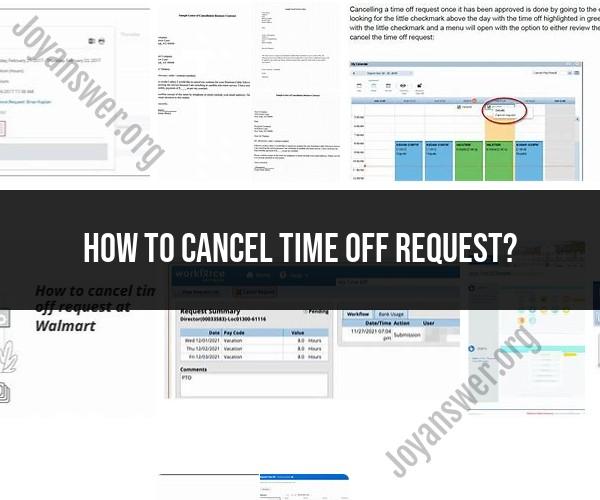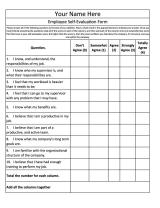How to cancel time off request?
Canceling a time off request typically involves a process that may vary depending on your employer's policies and procedures. Here are some general guidelines on how to cancel a time off request:
Review Company Policies: Start by reviewing your company's policies and procedures related to time off requests and cancellations. Your employee handbook or HR department should provide information on the specific steps to follow.
Notify Your Supervisor or Manager: As soon as you decide to cancel your time off request, notify your immediate supervisor or manager promptly. This can be done in person, through email, or using any preferred communication method specified by your company.
Provide a Reason: It's a good practice to provide a brief reason for the cancellation, such as a change in personal plans or work-related priorities. This helps your supervisor understand the situation.
Use the Requested Method: If you initially submitted your time off request electronically through an HR or scheduling system, try to cancel it using the same method if possible. This ensures that the cancellation is properly recorded.
Follow Up: If you don't receive confirmation of the cancellation within a reasonable timeframe, consider following up with your supervisor or HR department to ensure that your request is processed correctly.
Check Your Remaining Balance: If you have a limited balance of paid time off (e.g., vacation days or sick leave) and you've already taken time off, verify that your cancellation doesn't result in a negative balance or any issues with your accrued leave.
Communicate with Colleagues: If your time off request was approved and involved scheduling changes for your colleagues, communicate the cancellation to them as well. This allows them to adjust their plans accordingly.
Stay Flexible: Keep in mind that the ability to cancel time off requests may depend on factors such as staffing needs, company policies, and the notice period required by your employer. Be prepared to discuss potential alternatives with your supervisor if necessary.
Document the Cancellation: Maintain a record of the cancellation, including any email or written correspondence with your supervisor or HR department. This documentation can be useful in case of any future disputes or questions.
Plan Ahead: Whenever possible, try to cancel your time off request well in advance of the scheduled dates. Last-minute cancellations can disrupt work schedules and may be more challenging to accommodate.
It's important to remember that your ability to cancel a time off request may be subject to your employer's policies, the nature of the time off (e.g., paid vacation vs. unpaid leave), and the specific circumstances involved. Some employers may have strict policies regarding cancellations, especially if other employees have made scheduling adjustments based on your approved time off.
Always prioritize open communication with your employer and colleagues to minimize any potential disruptions caused by a time off cancellation.
Canceling Time Off Requests: Guidelines for Employees
Employees should always try to give their manager as much notice as possible when they need to cancel a time off request. This will give the manager time to make necessary adjustments to staffing and workload.
Here are some guidelines for employees when canceling time off requests:
- Notify your manager as soon as possible. The sooner you notify your manager, the more time they will have to make the necessary arrangements.
- Be honest about the reason for your cancellation. If you are canceling your time off due to an unforeseen circumstance, such as illness or a family emergency, be sure to explain this to your manager.
- Be willing to work with your manager to find a solution. If you are able, be willing to work with your manager to reschedule your time off or to find other ways to cover your workload.
Changing Your Plans: How to Cancel a Time Off Request
To cancel a time off request, you should typically contact your manager directly. You may be able to do this via email, phone, or in person.
If you are canceling your request due to an unforeseen circumstance, be sure to explain this to your manager. You may also want to provide documentation of the circumstance, such as a doctor's note or a copy of a death certificate.
If you are able to reschedule your time off or find other ways to cover your workload, be sure to discuss this with your manager.
Handling Unforeseen Situations: Cancelling Time Off Effectively
If you find yourself needing to cancel a time off request due to an unforeseen circumstance, it is important to be honest and upfront with your manager. Explain the situation to them as soon as possible and be willing to work with them to find a solution.
Here are some tips for handling unforeseen situations effectively:
- Be proactive. Don't wait until the last minute to notify your manager that you need to cancel your time off. The sooner you notify them, the more time they will have to make the necessary arrangements.
- Be honest and upfront. Explain the situation to your manager honestly and upfront. Be specific about what happened and why you need to cancel your time off.
- Be willing to work with your manager. Be willing to work with your manager to find a solution. This may involve rescheduling your time off, finding other ways to cover your workload, or taking a different type of leave.
By following these tips, you can cancel your time off request effectively and minimize the disruption to your team and your workplace.








